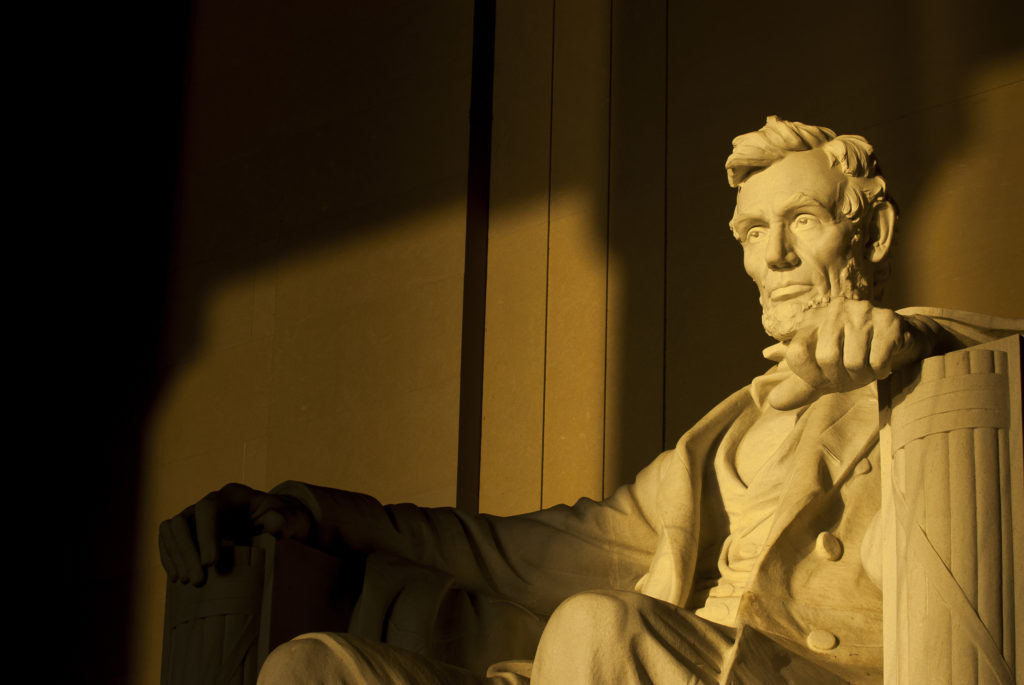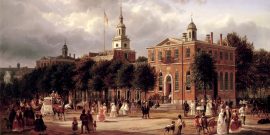Voegelin and Kendall, Harbingers of Postmodernism
Willmoore Kendall (1909-1967) was a brilliant, contentious, and independent-minded political philosopher dedicated to the proposition that the American political tradition consists in government by the people based on the deliberate sense of the community. Corollary to this principle was opposition to the assertion in the Declaration of Independence that “We hold these truths to be self-evident: that all men are created equal, that they are endowed by their Creator with certain inalienable rights, that among these are life, liberty, and the pursuit of happiness.”
The Basic Symbols of the American Political Tradition (1970), which Kendall coauthored with George W. Carey (1933-2013), is grounded in Kendall’s perception that the American political tradition has become “problematic.” (Kendall did not live to see its publication, but as Carey explained in the Preface to the Original Edition, its first four chapters were based on lectures Kendall gave at Vanderbilt University in 1964, and the last four were by Carey.) Historians teach the people to question the tradition by placing the “all men are created equal” clause at “the center of our political existence.” This machination, said Kendall, obviates “the tradition of American life as it is actually lived and thus a tradition of inequality.”
To set Americans on the right path, Kendall took up the teaching of German philosopher-historian Eric Voegelin (1901-1985). According to Voegelin (The New Science of Politics, 1952), the “task of political analysis begins with each people’s attempts at self-interpretation, at self-understanding, as a political society.” (Emphasis in the original.) Voegelin teaches that each people, in the course of constituting itself as a people, attempts to answer the questions “Who am I? What am I here for? Where do I fit into the constitution of being . . . What do I assert as true, as good, as meaningful, as beautiful?” These are questions that no political people constituting itself as a political society can sidestep.
Kendall states that Voegelin gives us no rules to tell us where to begin or what precisely to look for as we seek to understand a political society in terms of its representative symbols. Kendall infers two rules: 1) begin at the beginning, and 2) never lose sight of our people’s action. “Unless we can see a correspondence between the symbols we have at hand and the people’s action in history,” the symbols we have in hand do not in fact represent that people, and we must look a second time for the symbols that do in fact represent them.
The Mayflower Compact marks the beginning of America. It is the first political document ever composed in this hemisphere. Kendall says the Compact forms “a Christian society, which calls God in Witness to its act of founding, to . . . the glorification of God and the advancement, that is, one supposes, the development and propagation, of the Christian faith.”
Mayflower Compact symbolization initiates American political development. Kendall enthuses, “The possibilities . . . are numerous, and the symbolization is compact in the sense that it nails none of them down.” Left to the future are “all the decisions as to what, concretely, the symbols mean, what, concretely, they involve in the way of specific commitments.”
The Mayflower Compact says nothing about individual rights or equality. Insofar as the Compact is an exercise in the right to be free, it entails an equal capacity on the part of the signers to give or withhold consent. Kendall speculates that the Mayflower Compact will become the symbol of a society that will assert the kind of freedom and equality that will “place a high value on getting everybody’s consent to its law, or, at least, on achieving consensus.”
The Fundamental Orders of Connecticut (1639) and the Massachusetts Body of Liberties (1641) further define an American political tradition. Whatever we stand in the presence of, “it is not the symbol of equal rights,” according to Kendall. The Connecticut Orders reflect “the transcendent truth of the soul and society as continuously explored by Western man through the experience of philosophy and religion.”
The central issue in American politics, Kendall observes, is the tension between the symbol of the supreme legislature and the higher law that this legislature must apply to day-to-day problems. The question arises: Which comes first, the rights of individuals or the common good? In the traditional view, individual rights are those required by the common good. The vocabulary of individual rights does not comport with the resolution of political problems.
At this point in the exposition, Kendall jumps a century ahead to June, 1776 and the Virginia Declaration of Rights. At the “deepest level of symbolization,” this document embodies, “in Voegelin’s phrase, the truth of the soul and society made known by the greatest philosophers of the West.” Symbolically speaking, the Virginia Declaration establishes the Christian religion as “the public truth of American society.”
The Lincoln Derailment Thesis
The most significant conclusion arrived at in Basic Symbols holds that Abraham Lincoln derailed the American political tradition. Lincoln accomplished this feat in the Gettysburg Address of November 19, 1863, invoking the “all men are created equal clause” of the Declaration of Independence. Kendall observes that this clause “has been interpreted in such a way as to cause a derailment in our tradition,” and that this derailment “understandably caused a certain schizophrenia among us” so that “we do not really know who we are and where we are going.”
The “philosophical plants of derailment were seeded and began to grow full force” between the early years of the Republic and the Civil War. “This is precisely why Lincoln could speak in the manner he did at Gettysburg and get away with it.” The derailment was subsequently adopted by intellectuals and political actors as a mandate for “restructuring American society to produce a condition of equality.”
The Lincoln derailment thesis is subject to question. Basic Symbols, as I said, grew out of five lectures that Kendall delivered in the summer of 1964 at Vanderbilt. In none of these five lectures did he refer to Lincoln, the Gettysburg address, or a derailment of the American political tradition. Leo Paul S. de Alvarez states that Kendall did not question therein Lincoln’s political thought or his place in the American tradition.[1]
An earlier Kendall work, The Conservative Affirmation in America (1963), contains a passage stating that the equality to which, say, Abraham Lincoln was born, is “an equality that conferred upon him merely an equal right to compete with his fellow-men in the race, as we fellow-men run it here in America, for whatever prize he in his equality chose to go after.” Kendall furthermore argued (in Basic Symbols) that the Virginia Declaration of Rights, not the Declaration of Independence, is the key document in symbolization that defines the right of the people to govern themselves through a representative assembly. Thus the rights of individuals are legal rights conferred or withdrawn by the representative assembly as required by the common good.
Carey, Kendall’s coauthor, noted that since “additions and changes of fairly substantial nature were definitely called for” to complete Basic Symbols after the death of Kendall, he “felt less constrained in editing or adding to Chapter 8, ‘Derailment and the Modern Crisis.’ ” Carey further observed that Basic Symbols dealt with “superficial manifestations of our derailment,” the causes of which are “far deeper and more complicated than we have suggested.” Reflection within the horizon of Voegelinian symbolism was called for.
Voegelin teaches that sets of basic symbols throughout the West are variants of the myth of Moses, the Covenant, and the Promise. They are subject to one or another variant of the kinds of derailments that happened to the people of Israel as chronicled in the Old Testament. Derailments run pretty much to type, the function of the basic symbols being “to express the relation between political society and God.” “The basic symbols may be so manipulated as to leave out God altogether, to cut man off from anything and everything higher than himself in the constitution of being, to set man up as God.” Kendall says this “represents a very fundamental derailment and the most dangerous one.” People who experience such a derailment “are not likely to enjoy waiting for a deliberate sense of community,” nor are they likely to content themselves with any process of persuasion and conviction because “they know that they are right.”
Grasping at Straws
From the Voegelinian perspective, the most important derailment has God appointing America as the arbiter of mankind and supreme judge of all people. Americans are God’s people, building the New Jerusalem over the face of the earth. “God made human nature to begin with, and we, as God’s chosen people, will remake it.” Kendall/Carey declare this a false myth. The basic symbol of the American political tradition, they contend, remains “the representative assembly deliberating under God; the virtuous people, virtuous because deeply religious and thus committed to the process of searching for the transcendent Truth.” (Emphasis in original.)
De Alvarez views the Voegelinian turn as problematic. Symbolization is “a comprehensive articulation of the order of being” that gives meaning to existence. It makes “the essentially unknowable order of existence intelligible as far as possible.” A symbolization “is, in effect, a sudden breakthrough which human beings create,” writes de Alvarez. To use the word “symbol” is to suggest that it is essentially unknowable, “something thrown up.” Consciousness is a Voegelinian trope that “constitutes the spaceless and timeless world of meaning, sense, and the soul’s order.”[2] De Alvarez asserts that Kendall, following Voegelin rather than philosopher Leo Strauss (with whom Kendall carried on an extensive correspondence), “betrays the ultimate bases of his thought. In that he is truly Rousseauian.”
It is disconcerting, finally, to ponder the meaning of Kendall’s assertion that whether the basic myth of the American people “happens to be historically true, as we believe, is the least important thing about it.” Not to put too fine a point on it, but Voegelinian symbolization obscures more than it discloses reality. From a postmodernist standpoint Kendall might be seen as ahead of his time.
[1] Leo Paul S. de Alvarez, “The Missing Passage of ‘The Vanderbilt lectures,’” in Willmoore Kendall: Maverick of American Conservatives, edited by John A. Murley and John E. Alvis (Lexington Books, 2002), pp. 142-43, 154.
[2] Ted V. McAllister, Revolt Against Modernity: Leo Strauss, Eric Voegelin, and the Search for a Postliberal Order (University Press of Kansas, 1995), p. 230.


